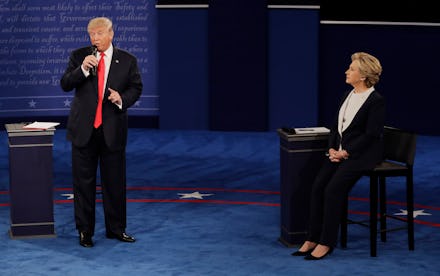There's one crucial word you didn't hear during Sunday's presidential town hall

Of the more than 16,000 words uttered at Sunday night's debate, not one of them was "Ferguson."
The debate took place at Washington University in St. Louis, an eight-mile drive from the suburb that erupted in rebellion following the 2014 death of Michael Brown, an unarmed black teenager, and the failure to indict the officer who shot him, Darren Wilson. It was a moment that shifted America's discourse around race and policing, and helped usher in the Black Lives Matter movement.
But if you watched Hillary Clinton duel Donald Trump on Sunday, you'd never know it happened. On a night filled with personal vitriol unlike any other we've witnessed in modern political history, Ferguson — and the demands for a radical rethinking of black life in America that it prompted — wasn't even a footnote. Instead, the candidates spoke about race in vague generalities that often missed the point entirely.
Trump insisted he'd help "the African-Americans," showing that he talks so little about black communities he doesn't even know how to use "African-Americans" in a sentence. He reprised his pitch to black Americans from the first debate, when he said that circumstances were so bad for this demographic under the status quo that they should vote for him because "what do you have to lose?"
But Trump showed he fundamentally misunderstands the problems plaguing law enforcement. With violent crime at the lowest rate the country has seen in decades, he and other Republicans have insisted we're on the brink of anarchy.
"We're going to bring back law and order," Trump said in his opening statement during Sunday's debate. "We have to bring back respect to law enforcement."
The "law and order" policies Trump has espoused include stop and frisk, the racially discriminatory program in New York City that was struck down as unconstitutional in 2013, which Trump wants to expand nationwide. He then condemned the violence that ails "inner cities," naming Charlotte, Chicago, and Washington, D.C.
But Trump didn't mention Ferguson, a place that's representative of the resource-starved suburbs that increasing numbers of black people facing displacement from cities are calling home. It is in Ferguson — not the "inner city" — that the Justice Department found that the "harms of Ferguson's police and court practices are borne disproportionately by African-Americans, and there is evidence that this is due in part to intentional discrimination on the basis of race." But the institutional racism that sparked a protest movement nationwide did not fit neatly into Trump's "law and order" narrative.
For her part, Clinton waxed poetic about Trump's uncanny ability to alienate every voting blog under the sun, but didn't say much about her own agenda to level the economic and social playing field on which too many black communities are losing. She did, however, talk about some of her track record.
"I started off as a young lawyer working against discrimination against African-American children in schools and in the criminal justice system," Clinton said. "I worked to make sure that kids with disabilities could get a public education, something that I care very much about. I have worked with Latinos — one of my first jobs in politics was down in south Texas registering Latino citizens to be able to vote."
But even that answer doesn't drill down the specifics of what she would do on a federal level to make law enforcement accountable to the communities they control.
This is what Black Lives Matter is fighting against -- the occasional blip and then complete erasure of black people's interests from the nation's political agenda. Perhaps this is why the movement's refusal to endorse any candidate, roundly criticized by politicians and activists alike during the primaries, makes sense. The movement for black lives is not an election-year interest group. Given law enforcement's longstanding siege of black communities, it can't afford to be.